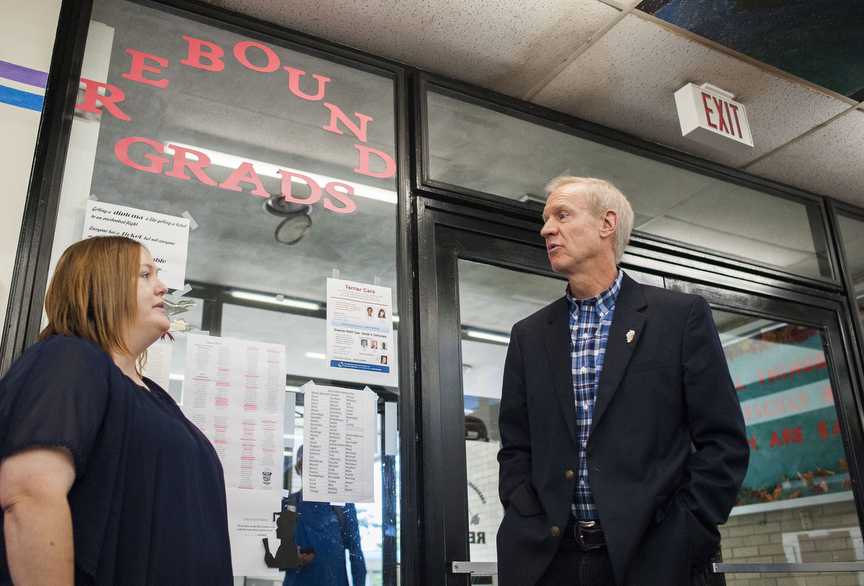Rauner to start borrowing $6 billion today
Stephanie Brown, left, a family educator at Carbondale High School’s Rebound program talks about recent graduates with Gov. Bruce Rauner during his visit Friday, Aug. 26, 2016, in Carbondale. (Ryan Michalesko | @photosbylesko)
October 17, 2017
Gov. Bruce Rauner’s administration will go to the bond market on Tuesday with plans to borrow $6 billion in the coming days to help pay down nearly $16 billion in bills the state owes to scores of businesses large and small.
The state will seek a total of $1.5 billion in tax-exempt general obligation bonds Tuesday, followed by another $4.5 billion in bonds next week. The money will be used to refinance the state’s bill backlog, shifting debt to willing lenders and off of contractors that have been left waiting months to be paid.
Though the state went two years without a budget amid fighting between the Republican governor and Democrats who control the legislature, government continued to spend money and rack up debt. A series of laws, one-time agreements and court orders meant money kept going out the door. And the Rauner administration continued to sign contracts, whether or not the money was there to pay for it. The state’s nearly $16 billion backlog of bills is triple the amount when Rauner took office in January 2015.
Advertisement
Under state law, unpaid bills can accrue as much as 12 percent in interest a year. The bipartisan Commission on Government Forecasting and Accountability has estimated that could mean as much as $2 million a day. The state can more than cut that interest rate in half by borrowing at a lower rate on the bond market.
The state last borrowed money in November 2016, selling $480 million in bonds at an interest rate of just under 4.25 percent, according to the governor’s budget office. Illinois pays higher rates than other states because of its worst-in-the-nation credit rating.
Rauner’s budget office estimates that after borrowing, Illinois’ pile of unpaid bills will drop to $7.5 billion by the end of June 2018. But administration officials warn that without further budget cuts in the coming years, the backlog could once again skyrocket to nearly $14 billion by 2023.
That analysis was echoed by S&P Global Ratings, which said refinancing the state’s bill backlog with long-term bonds “entails some risk.”
“If the bonding plan is not paired with additional fiscal adjustments, the state could be left with a higher tax-supported debt burden and — once again — an escalating backlog of unpaid bills,” the ratings agency said in a report issued last week. (Monique Garcia)
___
(c)2017 the Chicago Tribune
Advertisement*
Visit the Chicago Tribune at www.chicagotribune.com
Distributed by Tribune Content Agency, LLC.
Advertisement








